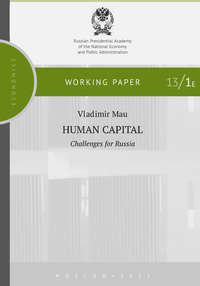Kitap dosya olarak indirilemez ancak uygulamamız üzerinden veya online olarak web sitemizden okunabilir.
Kitabı oku: «Human Capital. Challenges for Russia»
Russian Presidential Academy of the National Economy and Public Administration

Key words: human capital; education; healthcare, pension system, socioeconomic policy. JEL: E24, G23, H75, I15, I18, I25, I28.
The search for national priorities
The debate over national priorities that began when the Communist period of Russian history ended has now almost run its course. A consensus has been reached in our understanding of the crucial importance for the country of those sectors of the economy that are associated with the development of the individual (the development of human capital or of human potential).
This is a great step forward in our social awareness. For one thing, we do need widespread agreement as to what the key issues are for Russia’s economic development if we are to overcome the after-effects of the fundamental revolution that we experienced at the end of the twentieth century. A revolution shatters the value system of a society and it takes much longer to acquire new values than it does radically to deconstruct the old regime.
Secondly, and this deserves particular emphasis, the giving priority to human capital means that society acknowledges the post-industrial character of the challenges that it faces: in searching for a new model of development it looks not to the past but to the future. It is not so very long ago that discussion of national priorities focussed on the key sectors of the economy of the last century: the aircraft industry, machine construction, ship-building, electricity, agriculture were given priority by Russian politicians and economists in policy for economic development and, what is most important, in budget expenditures. It was only in the mid-2000s that the elite began to address the issue of social capital. Education and healthcare were the first to receive attention, followed by the pension system. Egor Gaidar was the first to point out the crucial importance of these sectors for the future economic development of Russia (see Gaidar, 2005). The programme of «priority national projects» introduced by V.V. Putin and D. A. Medvedev in 2005 endorsed these priorities.
Russia is not alone in facing this challenge. Creating an effective system for the development of the potential that is latent within the population is a problem that confronts all of the relatively developed countries. The challenges of the postindustrial era and demographic change have made for a «crisis of the „universal welfare state" and forced many countries to accept the need for profound transformations in the social sphere. At a time when population ageing has become endemic and the demand for social services has continued to increase the need has arisen for a fundamentally new model of social support. In other words, Russia is facing not so much a crisis of the system of social services that was created during the Soviet period but a much deeper crisis of industrial society. This means that a new policy for the social services social must be sought not in the process of «catching up» in economic development but as a response to the general problematic that Russia, in common with other developed countries, is facing. The collapse of the Soviet Union should be understood as having been a crisis of the industrial system and of the welfare state that was a part of that system.
To date, no country has succeeded in developing a system that is capable of responding to contemporary challenges in the development of human capital. This means that the search for an optimal model of development need only to a minimal degree take into account efforts that have been made elsewhere.
Moreover, the country that succeeds in creating a viable system will acquire an enormous advantage in the post-industrial world.1
According to the traditional (industrial society) model, these sectors belong to the social sphere of the economy. But for all the importance of the social dimension, the development of human capital in modern developed countries is known to interact with and depend also upon fiscal and investment considerations and to have political implications. Unlike the end of the nineteenth and most of the twentieth centuries, education, healthcare and pension provision now involve the entire population (as taxpayers and as consumers of these goods). The demographic crisis has added to the complexity of this state of affairs. Funding the development of these sectors has become a dilemma for national budgets and can undermine the financial stability of any developed country. What is more, the funding of these sectors has to be long-term and this has significant implications for any country’s investment resources. Finally, the political and social stability of societies in which the urban population is predominant depends upon the efficient functioning of these sectors.
Ücretsiz ön izlemeyi tamamladınız.

